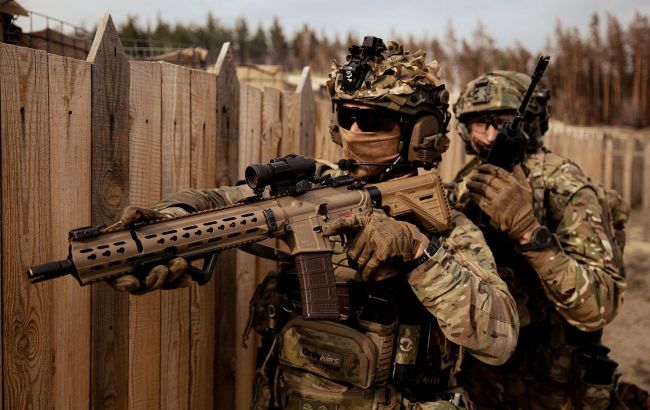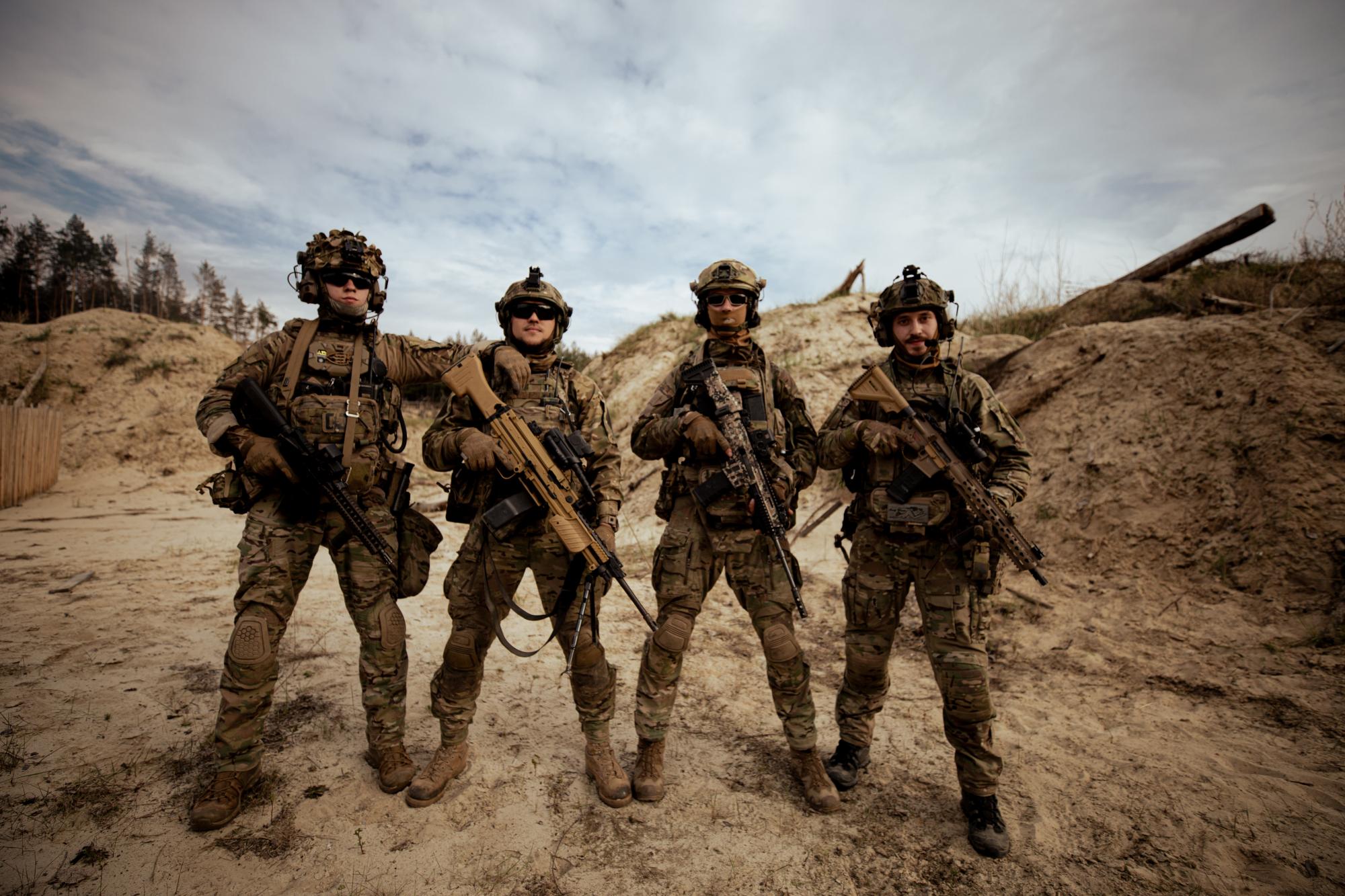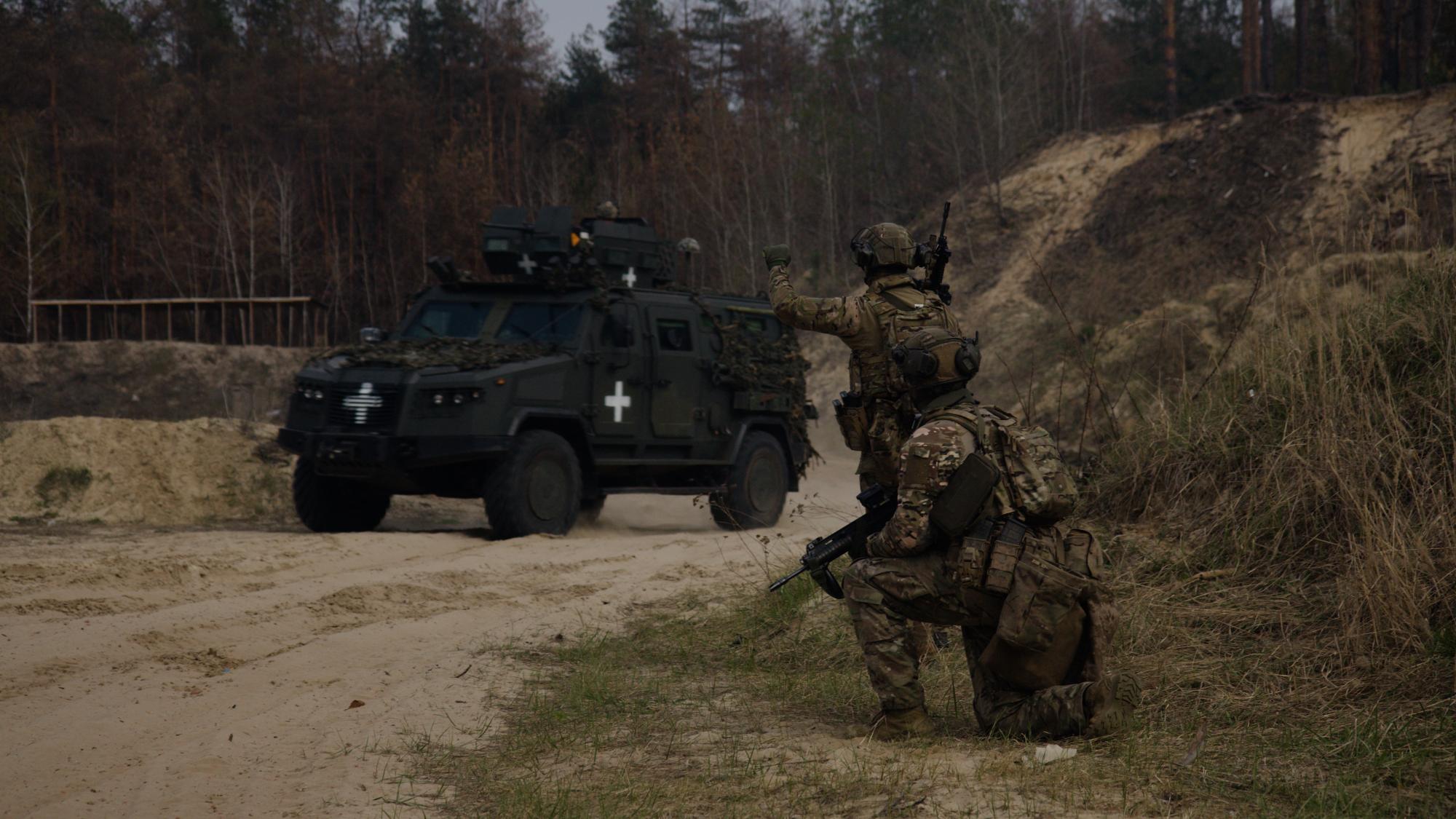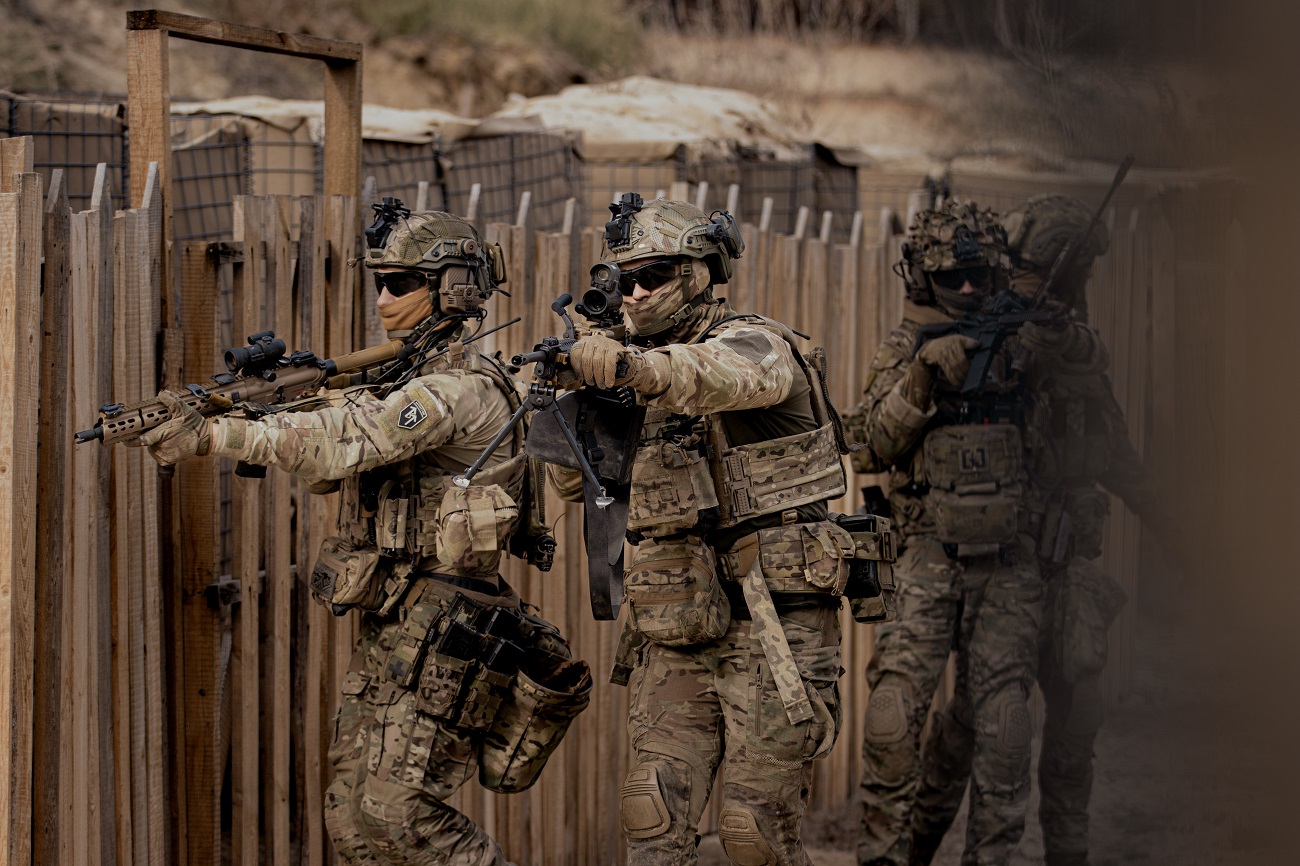Spy operations, training, and Russia's strengths: Interview with Ukraine's Kraken commander
 The Kraken combat unit (photo: Department of Active Operations)
The Kraken combat unit (photo: Department of Active Operations)
The Kraken combat unit, part of the Defense Intelligence of Ukraine, first gained fame during the defense of Kharkiv in 2022. Veterans, volunteers, and career military personnel strike fear into Russia with their daring military operations. RBC-Ukraine interviewed Alpha, the commander of the Kraken unit, about Russia's combat experience and tactics.
The Kraken is a combat unit engaged in active operations within the Defense Intelligence of Ukraine (HUR). It first gained notoriety in 2022 when it participated in the defense of Kharkiv. It is composed of war veterans, career military personnel, and volunteers.
Currently, Kraken conducts raids behind Russian lines, destroys sabotage and reconnaissance groups, and carries out assault missions in the most intense spots on the front line. The commander of this unit, Alpha, spoke to RBC-Ukraine about Kraken's combat path and the characteristics of the Russian troops they face every day.
— Kraken is one of the legendary units that has been tormenting the Russians with various stories. How did the history of your unit begin?
— From the moment I joined the unit, I have called it the People's Unit. This is because the idea behind the unit and its motivation come from the people. The unit was created a few months before the start of the large-scale invasion. A group of officers, on the orders of the head of the HUR, was in the city of Kharkiv.
We already had some information that the Russians were preparing to carry out some kind of active offensive action in one direction of the city of Kharkiv. This group worked to organize resistance and, if the Russians launched any actions, to meet the Russians and defend the city of Kharkiv. The group was formed from officers of the HUR and volunteers, mainly residents of Kharkiv.
Therefore, at the beginning of Russia's full-scale invasion, these people coped quite well with the task at hand. In a short period of time, they gathered a large number of people, volunteers, formed units, and began active training.
— Why Kraken?
— At one of the meetings, there was a proposal to name the unit Kraken. Why Kraken? It's a mythical name, you know, a monster that penetrates with its tentacles. And the mythical name comes from the fact that it is a powerful monster that defends, protects, and can penetrate any complex area or territory and guard it.
Now the unit is fighting on various fronts, carrying out combat missions. A large number of people are now joining the unit, not only from the city of Kharkiv, but from various regions of Ukraine. And the unit enjoys popularity and authority among the Ukrainian Armed Forces and citizens.
— When did you take command of the unit, and what was your first impression?
— I took command of the unit in June 2023. Since then, I have been performing the duties of commander of the military unit, commander of the Kraken active operations unit. I am a career military officer, and it was extremely interesting and difficult for me to bring together people from different social strata, with different mentalities, from different regions, and with different backgrounds.
There were ultras, Azov members, career military personnel, volunteers, and concerned citizens who joined the unit. None of them had extensive military experience. The difficulty was that everyone had their own vision of how to perform their duties. Now I know the unit and the people, there is complete understanding, and we are working.
— We know many commanders of prominent units of the Ukrainian Armed Forces. At the same time, you rarely communicate with the media, even though the unit has quite a few public spokespeople, such as Serhii Velychko, call sign Chili, and Kostiantyn Nemichev. Is this a conscious decision on your part, or are there other reasons?
— Let's start with the fact that Serhii Velychko and Kostiantyn Nemichev are no longer military personnel of the Kraken active operations unit of the Defense Intelligence of Ukraine. They have been transferred to the Armed Forces of Ukraine as part of measures aimed at supporting the reform of the Armed Forces' management and will strengthen the command structure of one of the newly formed army corps.
So, on behalf of myself, our unit, and the Defense Intelligence of Ukraine, I would like to thank them for their service and wish them new achievements in their new unit.
 Most of the Kraken military personnel were originally from Kharkiv, but now there are also defenders from different regions serving there (photo: Kraken press service)
Most of the Kraken military personnel were originally from Kharkiv, but now there are also defenders from different regions serving there (photo: Kraken press service)
Regarding your question, yes, it is a conscious decision. The unit consists of individuals who perform their duties daily. They are individuals with interesting backgrounds and their own stories. I believe it is appropriate to provide an opportunity to share these stories, as they motivate those who have not yet joined the Defense Forces to finally decide to defend their homeland.
Our guys are an example of the fact that it is impossible to be born for war, but it is possible to become a real warrior. And the commander's task is not to be constantly present in the media space, but to ensure that the unit has everything it needs, all the opportunities to effectively perform its tasks. And, of course, to protect the lives of the fighters.
— When selecting fighters, what qualities do you pay attention to? Experience, skills? After all, your unit performs quite complex tasks.
— This person must be motivated and have a desire to join the unit. Then we have several stages of testing, and this is key, because not every soldier can join the unit. But it all starts with motivation.
Accordingly, interviews are conducted with recruits and commanders. We determine the key skills of each person. Because if, for example, your skills do not allow you to be an assault component or a scout, this is taken into account. After that, there is an additional selection and study of the person.
Some individuals are not eligible to join us. These are individuals who have close relatives in temporarily occupied territories, in Russia, or who are involved in criminal proceedings. We screen these individuals out. Once they have passed these specific selection stages, basic general military training begins. After professional training, the individual is assigned to a unit.
— Are there any special features of professional training at Kraken?
— The special features of our training are the professional training that takes place before joining a unit. We focus on survival, professionalism, planning, topography, and communication. This is because a person must be able to act professionally on the battlefield and must be able to orient themselves. Even at this stage, we can weed out people.
That is, we can see if a person is not up to the task, or if they have certain health limitations, or if these limitations arise during the process. But it is always crucial for us that a person is ready for the unit they will be assigned to. So that there are no problems when performing combat tasks. Because then it becomes a burden for the group, a problem for the units, for the commander who leads them. This is key, and we pay attention to it.
— Are there any rituals and traditions in the unit?
— Of course, there is. The initiation ceremony is a ceremony where personnel line up, traditionally with speeches, and we present military personnel with chevrons, but they receive them after completing their first combat mission. The units also have their traditions, and they hold collective prayers.
This is very motivating for the personnel. Because every team, every unit, is its own combat family. These are people who are so close to each other, they feel each other, they understand each other. That's why it's so important. But in general, if we take the whole unit, we mark our brothers-in-arms, who are an example for the young recruits.
— Do you personally have any rituals that guarantee that the operation will go well?
— I do have my rituals that I perform for myself, because for me, the loss of every soldier is a problem. It is a problem in general because we are very careful in selecting our soldiers. We try to select the best. When you lose the best, it's hard. Then it's hard to replace them. And it's psychologically difficult for people. When there is no one left among your brothers-in-arms to replace someone else.
 Soldiers defend the country on the most dangerous sections of the front line (photo: Kraken press service)
Soldiers defend the country on the most dangerous sections of the front line (photo: Kraken press service)
Training a professional takes time. And with such intense combat missions, we cannot do it quickly. Wherever we work, we deal with difficult tasks. That is why I have my methods and rituals that I use to ensure that everything is fine in my unit and with the guys. And I can tell you that it works. If you believe in it, it works.
—Tell us about the unit's successful operations.
—The Kharkiv operation. I believe that the unit played one of the key roles there. There were many operations in which we participated, and they were successful. It was the Kupiansk direction at the end of 2023, where we successfully worked and destroyed a large number of enemies. We also held Chasiv Yar for a long time. The settlement of Novyi. We completed the task there, and I believe the command as a whole appreciated it.
— Did you know about the Russians' second attempt to advance on Kharkiv? Did you prepare in advance?
— As an intelligence agency, we have some information about certain actions or preparations for certain actions. Yes, we understood that there might be some action. Yes, we carried out some preparatory measures, and we worked in the Kharkiv region to understand the main direction in which the Russians might advance.
At the time when Kharkiv-2 began, we were carrying out tasks in Chasiv Yar. The task of the head of the HUR was to transfer part of the forces to the Kharkiv direction, where we worked together with the Defense Forces of Ukraine.
Therefore, all active units focused their attention there to prevent the Russians from reaching the village of Lyptsi and taking control of it, and thus preventing them from advancing their artillery and other weapons to shell Kharkiv.
— What do you attribute our success in that direction to? What exactly helped to hold back the enemy at that time?
— I can say that we were motivated. The motivation of the guys who worked there was to prevent the Russian troops from entering Kharkiv. And the people of Kharkiv fought for this like no one else. We continued to build up our forces in that direction, and all efforts were focused on preventing the Russian forces from breaking through. And I believe that we accomplished this task.
— Next for you was the Zaporizhzhia direction. What were the tasks there?
— We all know the Kamianske direction, where we also worked together with the active operations unit of the HUR Artan. We were in the Kamianske direction in the first half of October and in November. I believe that we also accomplished the task there.
— Why was this direction important to Russia?
— We see in the media that the main goal that Russia is trying to achieve is those territories, those settlements, regional centers, which it declared in the constitution to be theirs. These are Kherson and Zaporizhzhia. Therefore, they are trying to accomplish their task. And our task is to prevent them from doing so.
 Kraken fighters were among those who prevented the Russian troops from entering Kharkiv (photo: Kraken press service)
Kraken fighters were among those who prevented the Russian troops from entering Kharkiv (photo: Kraken press service)
— Do you see any intention on their part to advance to the Dnipro River? Do you think that is possible?
— Analyzing the available information, it is possible that they have such plans. But I believe that they are unrealistic. They are suffering enormous losses. I can safely say that, as of today, their personnel losses are enormous. I think time will tell. But we are taking all measures to prevent this from happening. And so are the defense forces.
— How would you assess Russia's situation in the areas where you have been? What are their strengths and weaknesses at the moment?
— I wouldn't call it a strength, but I would call it a problem for us. They have a huge amount of human resources, which they do not spare in carrying out their tasks. I understand that this is inhumane, but they need to accomplish their tasks at any cost. I would not say that they are currently using equipment in any of the areas, because equipment is the primary target for destruction for FPV drones. Since the war has now moved more into this field, it is a war of artillery and FPV drones in the sky.
They also have a successful use of FPV components. Overall, they have learned well from our experience, because we started using these tools earlier and achieved good results. They are also making good use of fiber optics, digital frequencies, and analog frequencies, and their calculations are working well. This is what complicates the advance of our forces and, directly, the infantry component.
— What are the main operations your unit is currently carrying out?
— Some of the main operations are special, active actions. They include many aspects. It all depends on the direction and the specific task. We can also carry out offensive operations.
— Do you have to carry out sabotage operations deep behind Russian lines?
— We have such tasks. They are carried out with the aim of destabilizing, improving the situation and position, creating certain conditions for reconnaissance of the actions of the Ukrainian Defense Forces, and reconnaissance of the actions of our units.
— Do you believe in freezing the conflict, that they can agree to some condition to stop at least at the current borders?
— As of today, I do not see any such precedents for freezing. I see that everything is changing. We are focused on the battlefield and successful results.
The main thing for us is not to lose as much of our territory as possible. That is what we are working on now. In some respects, it is possible to regain what is possible. I believe that we will be able to regain what we have lost. And we must move towards this. This is our overall motivation for accomplishing our tasks.

